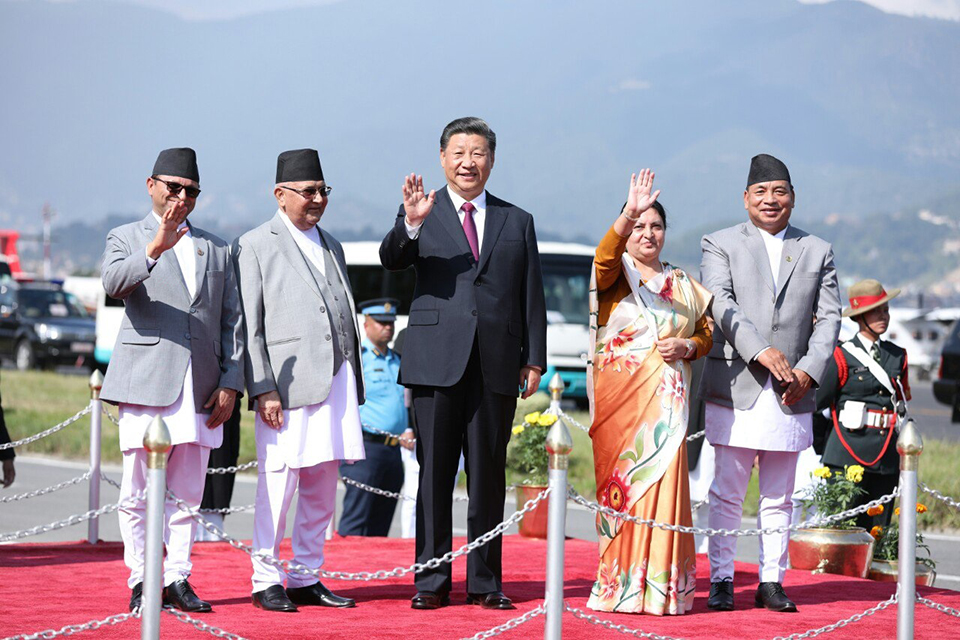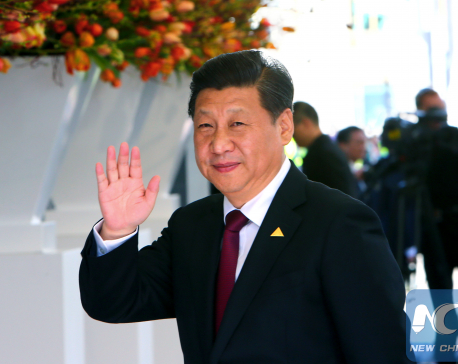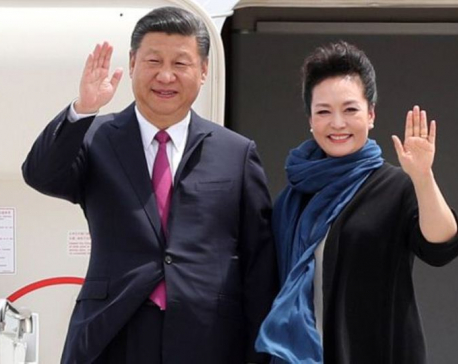
OR
Commentary
Party's over, get down to work
Published On: October 15, 2019 07:25 AM NPT By: Subhash Ghimire | @subhash580

Kathmandu, Oct 15: The state visit of Chinese President Xi Jinping to Kathmandu couldn't have come at a better time. After years of political uncertainty, Nepal is trying to project itself as a confident nation, ready to engage with the rest of the world.
The flower pots on Kathmandu streets have been removed and the giant flex images of a smiling Xi torn down. The city is back to work, but the reverberations of the Xi visit will be felt here for a long time. The visit was the culmination of much effort from the Nepali side, including many visits to China by our prime minister and president. Nepal needed to host a visit of this level to announce to the world that we are ready for business.
And business is what is at stake with China. In a polite way, President Xi reminded Nepal of the need to complete projects once started. Perhaps he was alluding to years of delay in the ring road expansion and other projects under Chinese support. CPN leader Prachanda keeps on saying that his party will rule Nepal for another 50 years. Xi reminded Nepal's leaders that the Chinese Communist Party has been in power for 70 years because of its ability to deliver on promises made. He cautioned the Nepali side to work hard to deliver on its promises. Moreover, he also reminded leaders here to adopt a lifestyle that the public approves of.
A Nepali delegation was in Beijing in June of this year to discuss the DPR of the Keurung-Kathmandu railway project, and the Chinese side pointed out the lack of preparation on our side. The delegation returned home without signing any agreement. In private conversations, Chinese diplomats in Kathmandu say they are frustrated by the slow pace of Nepal's bureaucracy and the government's inability to make things happen. For Xi and his government, delivery matters. China wants to see its projects completed on time.
Regional and international dynamics
That President Xi chose to visit Nepal right after his two-day informal meeting with Indian PM Narendra Modi in Mamallapuram , India was not a coincidence. It was not possible for those two not to discuss Nepal-related issues, especially those concerning the connectivity front. Indian media and some of their political pundits are fuming over Nepal “leaning to China” and declare that India has “lost” Nepal to the northern neighbor. Both India and China understand that a railway line to Kathmandu only makes sense if it is to be connected to India and beyond. We can only hope our leaders understand the regional dynamics and deal with this massive project accordingly.
Nepal must not lose sight of the bigger picture when it comes to dealing with big powers. The $500 million grant from the United States is yet to be ratified by our parliament. Despite assurances from our government that the Millennium Challenge Corporation (MCC)would be ratified at the last session of parliament, it did not happened . Nepali officials say the new session of the legislature will take it up as its first order of business. American Ambassador to Nepal Randy Berry has been vocal about the danger of Nepal losing the hefty grant if MCC is not ratified quick. It would be a shame if Nepal lets it slip through its fingers.
What's next?
As winter sets in, Kathmandu politics will surely heat up. There are already echoes of a change of guard at Singha Durbar. CPN Co-chairman Prachanda has voiced displeasure over PM KP Oli's reluctance to publicly announce an intention to hand over to him either the premiership or the party chair . The political theater within the CPN will not just be interesting but the rumors of Chinese, Indian and even American roles in this will be dissected for months. After all, we all seem to easily buy into conspiracy theories at face value. How a change of leadership at Singha Durbar or at the CPN will impact our relations with the big powers is yet to be seen. Our leaders must learn to not let power struggles within one party influence our dealings with friendly countries.
The Chinese are hoping that the euphoria of the Xi visit won't die out before the two countries begin hammering out the details of the projects they have signed for. Their hope is the momentum of the visit will propel both countries to work quickly on projects that are of mutual interest. We now have a blueprint for developing mutual trust so that the 20 agreements signed up in Kathmandu last week will materialize. We can only hope our side exercises caution, wisdom and maturity while dealing with heavyweights like China, India and the United States.
You May Like This

Xi leaves Beijing for India, arriving in Nepal tomorrow
KATHMANDU, Oct 11: Chinese President Xi Jinping left Beijing on Friday morning for the second informal meeting with Indian Prime... Read More...

Ahead of his Nepal visit, Xi hopes two countries can together draw up new blueprint for bilateral ties (Full text of Xi's signed article)
KATHMANDU, Oct 11: A signed article by Chinese President Xi Jinping titled "Toward Greater Progress of China-Nepal Friendship across the... Read More...




Just In
- Insurers stop settling insurance claims after they fail to get subsidies from government
- Nepal-Qatar Relations: Prioritize promoting interests of Nepali migrant workers
- Health ministry to conduct ‘search and vaccinate’ campaign on May 13
- Indian customs releases trucks carrying Nepali tea, halted across Kakarbhitta
- Silent period for by-election to begin from midnight
- SC issues short-term interim order to govt and TU not to take immediate action against TU legal advisor Khanal
- National consultation workshop advocates to scale up nutrition smart community in Nepal
- Patan High Court issues short-term interim order to halt selection process of NTB’s CEO













Leave A Comment